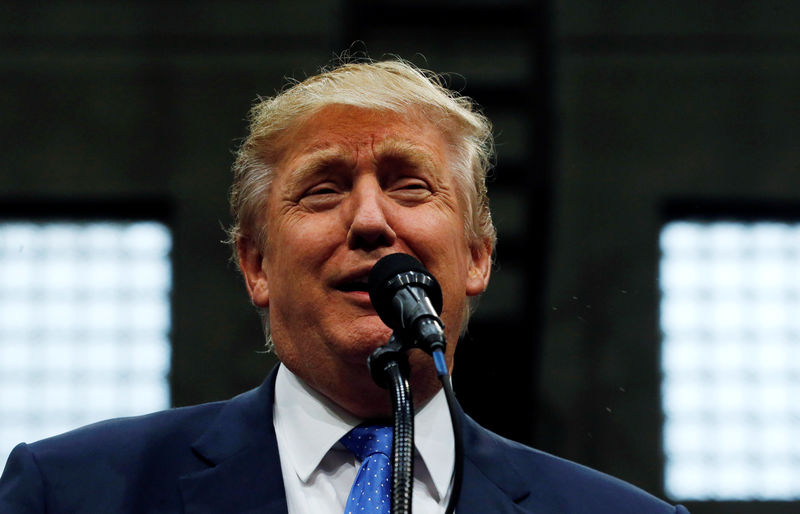(Bloomberg) -- With two months to go until Election Day, U.S. President Donald Trump is trying to make good on a number of trade promises to protect key constituencies in swing states to bolster support for his campaign and vulnerable Senate Republicans.
Mexico on Friday begins issuing pre-approval permits on some steel exports to ensure they aren’t just rerouted from China. The step was negotiated with the U.S. to avoid tariffs that America used against the nation last year on national-security grounds and seems aimed at states that are top producers, including Pennsylvania and North Carolina.
Trump’s trade envoy this week also asked that the U.S. International Trade Commission probe whether Mexican blueberries have hurt American farmers and hold talks to address concerns about strawberries from south of the border. The steps look targeted to win over growers in Georgia, Michigan and Florida and come after years of requests for protection by Republican Senators Marco Rubio and Rick Scott.
The moves follow tariffs on Canadian aluminum and come in spite of a new North American trade deal entering into force in July where a U.S. demand for seasonal agriculture tariffs was ruled out. Trump also cut the cap on allowable steel from Brazil and extended aid to Maine lobster farmers hurt by his trade war with China, a longstanding request from Senator Susan Collins. White House Trade adviser Peter Navarro last week highlighted steps to help Minnesota’s logging industry.
“Protectionist actions by an incumbent in a re-election campaign are not new, but the lack of any real analysis as to whether these actions help or hurt the national interest is stunning,” said Rufus Yerxa, president of the National Foreign Trade Council in Washington and deputy U.S. Trade Representative during the George H.W. Bush administration. “As long as it buys votes in battleground states, they’ll keep doing it.”
The press office of U.S. Trade Representative Robert Lighthizer didn’t respond to a request for comment.
The U.S.’s so-called Section 201 global safeguard investigation on Mexican blueberries -- which gives the president authority to impose trade restrictions -- will take time. Any action on the fruits or strawberries probably would come after the November election, and Mexican businesses are wary. The Latin American country’s national agriculture chamber has asked the government to look at reciprocal tariffs on U.S. exports such as corn or corn syrup if Mexico is hit with tariffs, said Juan Cortina, one of the organization’s vice presidents.
The move also introduces uncertainty for Mexican producers after the nation’s negotiators persuaded the U.S. to drop its demand for tariffs on imports from Mexico during the American winter months, known as seasonality, to reach the new trade deal known as the U.S. Mexico Canada Agreement, or USMCA, Cortina said.
“Of course it’s electoral,” he said in an interview. “The producers in Georgia and Florida have been asking for this for years. It injects uncertainty into our sector.”
Despite the pandemic, Mexican President Andres Manuel Lopez Obrador traveled to Washington in early July to meet with Trump, and the two pledged to deepen economic integration. During the visit, Lopez Obrador praised Trump for treating him with respect and said that the U.S. leader had never sought to impose anything on his administration in Mexico.
“It’s 100% political,” Kenneth Smith Ramos, Mexico’s chief technical negotiator for the U.S. Mexico Canada trade agreement reached in 2018 and a partner at consulting firm AGON, said of the actions on Mexican goods. “Trump is trying to do anything he can to get his base to say ‘He’s working for us.’”
On Thursday, Richard Trumka, president of the AFL-CIO, said the largest U.S. labor-union federation will file the first two known complaints about Mexico under the new trade deal within the next month.
“If we’re able to block products from coming in, it will get their attention real fast,” Trumka said.
